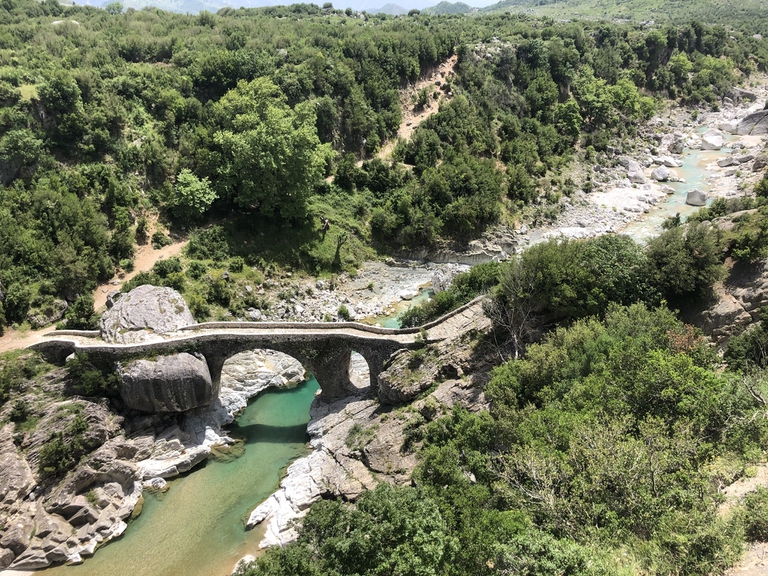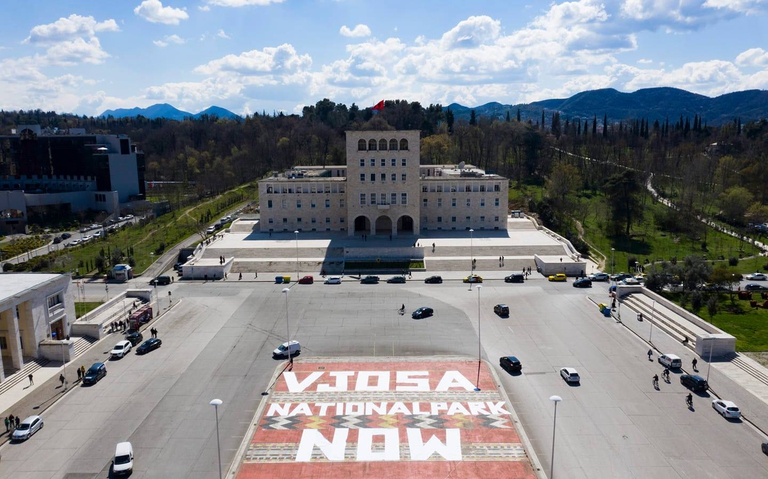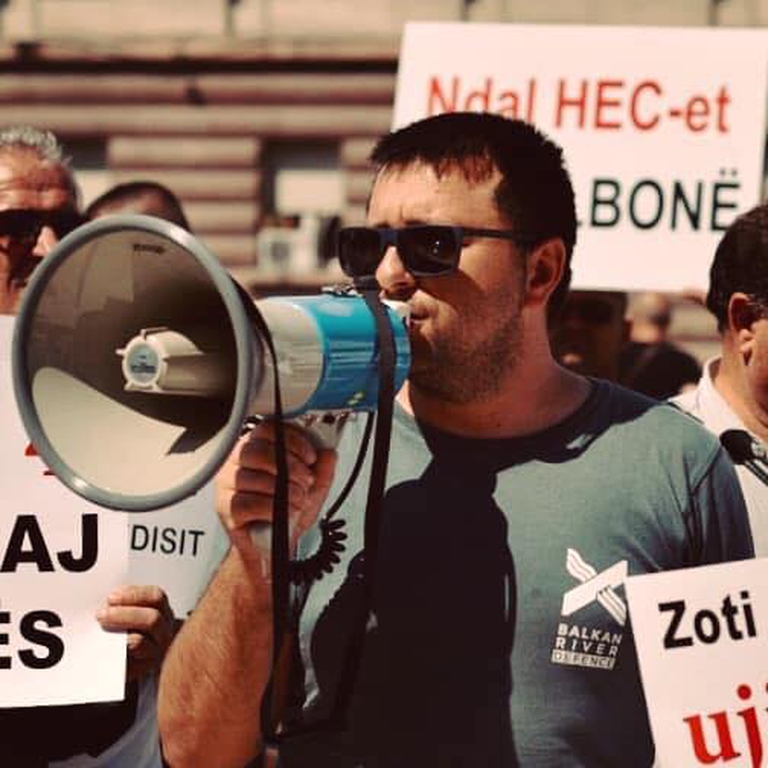
Water defender Eugene Simonov’s mission is to protect rivers and their biodiversity along the borders of Russia, China and Mongolia.
Europe’s last wild river, the Vjosë in Albania, is threatened by hydroelectric development. Activist Olsi Nika tells us about the international campaign to protect it.
curated by Christian Elia
“It would be nice to say that my passion for rivers has a romantic origin story, with my father or grandfather taking me out into nature, but this isn’t the case. My passion and commitment have grown out of studying”.
Olsi Nika is always in a hurry, much like Tirana, the Albanian city where he lives when he’s not working on some demonstration along the course of the Vjosë River. The latest of these protest initiatives involved all major cities in Albania and many other large cities around the world. The “Vjosa National Park Now” slogan was written in huge letters at many significant locations with the goal of raising public awareness both nationally and internationally regarding the most recent – and one of the most important battles – that Olsi and other Albanian and international activists have been fighting.
“My life changed when I got a degree in Environmental Biology. I went on to do a Master’s and I’m now finishing my PhD in Conservation Biology,” Olsi recounts. “By studying and doing fieldwork I witnessed with my own eyes the natural wealth and beauty that can be found in the world of the Vjosë River. These had to be protected at all costs. I was already involved as a researcher, and I became involved as a citizen too. The movement to save the Vjosë officially came into being in 2013, but for a long time prior to that, researchers had been collecting data to scientifically document the uniqueness of this resource. Year after year, the movement grew and ended up giving life to EcoAlbania, the NGO I direct, which arose out of a partnership with the Faculty of Science at Tirana University and has the support of international bodies like Save the Blue Heart of Europe and many others. The movement was born when we became aware of the government’s plans regarding the Vjosë to build power plants that would have forever changed Europe’s last wild river“.
Olsi and others started travelling to local communities, who have lived in symbiosis with the Vjosë for millennia. “We were appalled: none of them had been informed about the projects that were looming over their territories and communities. Day after day, year after year, community awareness grew and we supported their protests, helping get the media involved. It wasn’t easy, to get people talking about these communities and their battle in Albania. We strategically aimed to create an international campaign first, which, despite our limited means – and thanks to the help of international organisations – led us to get celebrities like Leonardo di Caprio and Manu Chao involved. Once that happened, media outlets all over the world started talking about the issue, and in the end, even local media were no longer able to turn a blind eye,” a smiling Olsi recalls.
The government’s plans for the Vjosë, which have changed over time, involved the construction of a dense series of small hydroelectric power plants. The project was presented as a great opportunity for the local population because it would create jobs, and for the country, which would’ve been able to produce an energy surplus to sell to neighbouring countries.
“What wasn’t being explained, however, is that the contracts were completely unproductive for the Albanian population. The baseline, for decades, was that just two per cent would remain in the hands of the State, while management costs would be paid with taxes and citizen’s utility bills,” explains the director of EcoAlbania. “The entire project was pushing for the concept of ‘sustainable’ but this is absurd: entire areas would be submerged by the disruptions to the river’s waters, while others would be deprived of it. The Vjosë is unique in Europe: no human intervention interrupts its course between Greece, where its source lies, and the Adriatic Sea. Its biodiversity, as scientific studies have shown in recent years, is unique. It’s as if they were trying to knock down the Colosseum to build a shopping centre. Even if there were some advantage to this, it would require destroying a unique and irreplaceable good. No economic advantage – which, as I have said, doesn’t even exist – is worth a decision like that.
Many international observers and experts in Albania see the battle to protect the Vjosë as a cultural turning point in the country, in terms of the its people’s environmental conscience. “It’s true, the battle for the Vjosë certainly represented a cultural movement before it was ever an environmental one. When the communist regime was still in power, the environment wasn’t seen as an issue as we understand it today. The term itself has only taken on the meaning it has now starting from 1994. And for years, after the regime fell, the general public didn’t have any interest in the idea of ‘public good’, because ‘public’ was synonymous with State and the State was the ‘enemy’. But the public good then gradually rediscovered its cultural heritage. The relationship between people and the Vjosë is told through tradition. Just think that many people called their daughters Vjosë, or that many studies have found a relationship between the traditional style of singing in the Vjosë region known as polyphony with the rhythm of the water and the sound that is created by the river flowing over stones and rocks”.
Last September, after a long battle, some good news finally came. Albanian Prime Minister Edi Rama announced that the Vjosë would become a national park. Does this mean the struggle is over?
“Absolutely not. In fact, this is a very delicate phase,” Olsi Nika replies. “We’ve worked hard on a new campaign in view of the elections on 25th April. We don’t just want the Vjosë to become a national park, but we want it to be the first national park that recognises the Vjosë as Europe’s only wild river. This is because we want a lasting guarantee of its protection, to avoid sudden political changes and the chance of renewed talk about hydroelectric power plants after the elections”.
What’s happening in Valona, where a protected area has been chosen as the site of a new airport, seems to prove Olsi’s point. “Only global safeguarding will be able to protect the Vjosë forever. Many activists, all over the world, put pressure on private companies. We don’t. Our target is the political world, we want the State to act as a State, for it to choose its citizens’ interests over private businesses. The latter only know one thing: profits. The State is different, it should commit to protecting the public good, and we will only be satisfied when there’s an ad hoc law protecting the Vjosë”.
EcoAlbania’s activities aren’t limited exclusively to fighting for the Vjosë. “We’re working to create an International Research Centre on the Vjosë, we provide education to schoolchildren, and continuously pursue scientific research,” Olsi concludes. “We want to give Albanian citizens the tools to protect their rights and territory. The Vjosë has always given life to the communities it passes through, and it can keep on doing so, perhaps through tourism. In recent years, despite all the stereotypes about Albania, people come here and fall in love with this country. Tourism can and must be sustainable, with a hospitality system spread throughout the communities that will live around the national park. And the Vjosë will continue to be as free and wild as it’s always been”.
Water Defenders is a Water Grabbing Observatory project celebrating the tenth anniversary of the recognition of the human right to water through a series of interviews that tell the stories of grassroots battles being fought for water all over the world. A multi-faceted struggle against resource exploitation and large as well as small projects that impact communities and natural environments. Ordinary yet extraordinary men and women across the world are defending this fundamental human right. Starting from World Water Day, 22 March, LifeGate regularly publishes features by the Water Grabbing Observatory, each centred on a person fighting to protect the most precious resource we have. And claim their right to water.
Siamo anche su WhatsApp. Segui il canale ufficiale LifeGate per restare aggiornata, aggiornato sulle ultime notizie e sulle nostre attività.
![]()
Quest'opera è distribuita con Licenza Creative Commons Attribuzione - Non commerciale - Non opere derivate 4.0 Internazionale.
Water defender Eugene Simonov’s mission is to protect rivers and their biodiversity along the borders of Russia, China and Mongolia.
The story of water defender Zica Pires, a young Brazilian activist fighting against the exploitation of quilombo land in Brazil.
Milica Kočović De Santo is a water defender working to oppose a hydroelectric plant in Stara Planina National Park, between Serbia and Bulgaria.
Canada’s wildfire season this year is impacting air quality way beyond the borders of the North American state, reaching as far as Europe.
Autumn Peltier is a water defender who began her fight for indigenous Canadians’ right to clean drinking water when she was only eight years old.
Salman Khairalla is an Iraqi activist who’s been fighting to protect his country’s marshes, a key water resource, since 2007.
Mohammed Reza Sahib, who fights for the right to water as a public good, has contributed to halting the privatisation of this resource in Indonesia.
He’s been fighting for solutions to India’s water crisis for a long time. Environmentalist and water defender Rajendra Singh tells us his story.
Moha Tawja is an activist fighting for the right to water in Morocco. The water defender tells us about the damage caused by the mining industry.










